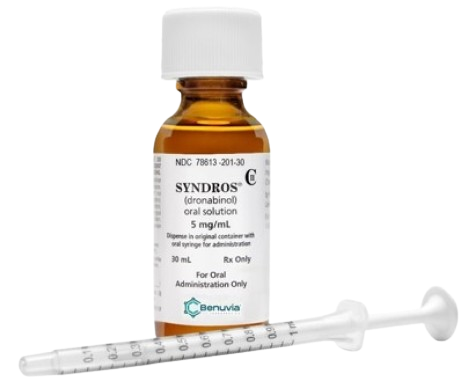
Indications and Usage
SYNDROS® is indicated in adults for nausea and vomiting associated with cancer chemotherapy (CINV) in patients who have failed to respond adequately to conventional antiemetic treatments and for the treatment of anorexia associated with weight loss in patients with Acquired Immune Deficiency Syndrome (AIDS)
What is the most important information I should know about SYNDROS?
SYNDROS can cause serious side effects, including:
- Worsening mental (psychiatric) symptoms. Psychiatric symptoms can worsen in people who have mania, depression, or schizophrenia and who take SYNDROS. SYNDROS taken with medicines that cause psychiatric symptoms can worsen psychiatric symptoms. Elderly people who take SYNDROS may have a greater risk of having psychiatric symptoms. Tell your doctor if you have new or worsening mood symptoms, including symptoms of mania, depression, or schizophrenia.
- Problems thinking clearly. Tell your doctor if you have trouble remembering things, concentrating, have increased sleepiness, or confusion. Elderly people may have a greater risk of having problems thinking clearly.
- Changes in your blood pressure. SYNDROS may increase or decrease your blood pressure, especially when you start taking SYNDROS or when your dose is changed. Tell your doctor if you have signs or symptoms of changes in your blood pressure including: headaches, vision problems, dizziness, feeling lightheaded, fainting, or a fast heartbeat. Elderly people, especially those with dementia, and people with heart problems may have an increased risk of changes in blood pressure and an increased risk of falls.
- Interactions with disulfiram or metronidazole. SYNDROS contains alcohol, which can cause you to have a reaction to medicines that contain disulfiram or metronidazole. You should not use any medicine that contains disulfiram (Antabuse) or metronidazole (Pylera, Flagyl, Flagyl ER, Nuvessa, Vandazole) if you take SYNDROS. You should not use a medicine that contains disulfiram or metronidazole for at least 14 days before you start taking SYNDROS and within 7 days after your last dose of SYNDROS. Tell your doctor if you have signs or symptoms of a reaction to disulfiram or metronidazole including: stomach-area (abdominal) cramping, nausea, vomiting, headache, and flushing.
What is SYNDROS?
SYNDROS is a prescription medicine used in adults to treat:
- loss of appetite (anorexia) in people with AIDS (Acquired Immune Deficiency Syndrome) who have lost weight.
- nausea and vomiting caused by anti-cancer medicine (chemotherapy) in people whose nausea and vomiting have not improved with usual anti-nausea medicines.
SYNDROS is a controlled substance (CII) because it contains dronabinol which can be a target for people who abuse prescription medicines or street drugs. Keep your SYNDROS in a safe place to protect it from theft. Never give your SYNDROS to anyone else because it may cause death or harm them. Selling or giving away this medicine is against the law.
It is not known if SYNDROS is safe and effective in children.
Do not take SYNDROS if you:
- had an allergic reaction to dronabinol. Signs and symptoms of an allergic reaction to dronabinol include: swelling of the lips, hives, a rash over your whole body, mouth sores, skin burning, flushing, and throat tightness.
- had an allergic reaction to alcohol.
- are using a medicine that contains disulfiram (Antabuse) or metronidazole (Pylera, Flagyl, Flagyl ER, Nuvessa, Vandazole) or have taken or received a medicine that contains disulfiram or metronidazole in the last 14 days.
Before taking SYNDROS, tell your doctor about all of your medical conditions, including if you:
- have or had heart problems.
- have or had problems with drug abuse or dependence.
- have or had problems with alcohol abuse or dependence.
- have or had mental health problems including mania, depression or schizophrenia.
- have had a seizure or have a medical condition that may increase your risk of having a seizure.
- are pregnant or plan to become pregnant. SYNDROS may harm your unborn baby. Avoid the use of SYNDROS if you are pregnant.
- are breastfeeding or plan to breastfeed. The Centers for Disease Control and Prevention recommends that mothers with HIV not breastfeed because they can pass the HIV through their breast milk to the baby. It is not known if SYNDROS passes into your breast milk. Talk to your doctor about the best way to feed your baby if you take SYNDROS. Do not breastfeed while taking SYNDROS and for 9 days after your last dose of SYNDROS if you are being treated for nausea and vomiting caused by anti-cancer medicine.
Tell your doctor about all the medicines you take or have taken in the last 14 days, including prescription and over-the-counter medicines, vitamins, and herbal supplements. SYNDROS and certain other medicines can affect each other, causing serious side effects.
How should I take SYNDROS?
- See the “Instructions for Use” at the end of the Patient Information for detailed instructions about the right way to take SYNDROS by mouth
or through a feeding tube, including the types and sizes of feeding tubes that can be used. - Always use the oral syringe that comes with your SYNDROS oral solution to measure your prescribed dose. Ask your doctor or pharmacist to show you how to measure your prescribed dose.
- Take SYNDROS exactly as your doctor tells you to. Your doctor may change your dose after seeing how it affects you. Do not change your dose unless your doctor tells you to change it.
- If you take SYNDROS oral solution by mouth, drink a full glass of water (6 to 8 ounces) right after you take your prescribed dose.
- If you take SYNDROS oral solution through a feeding tube, flush the feeding tube with 1 ounce (30 mL) of water using a catheter-tip syringe right after you take your prescribed dose.
- If you are an adult with AIDS with loss of appetite and weight loss:
SYNDROS is usually taken 2 times each day, 1 hour before lunch and 1 hour before dinner. If you are elderly, or unable to tolerate this dose of SYNDROS, your doctor may prescribe SYNDROS to be taken 1 time each day, 1 hour before dinner or bedtime.
If you are an adult with nausea and vomiting caused by anti-cancer medicine:
SYNDROS is usually taken 1 to 3 hours before your chemotherapy treatment and then every 2 to 4 hours after chemotherapy for up to 4 to 6 doses each day. If you are elderly, your doctor may prescribe SYNDROS to be taken 1 to 3 hours before your chemotherapy, 1 time each day.
Take your first dose of SYNDROS on an empty stomach at least 30 minutes before eating. After your first dose of SYNDROS, you can take SYNDROS with or without food.
After your doctor has decided the dose of SYNDROS that is right for you, take SYNDROS exactly at the same time before or after meals during future chemotherapy treatment.
If you take too much SYNDROS, call your Poison Control Center at 1 -800-222-1222 right away or go to the nearest emergency room.
What should I avoid while taking SYNDROS?
Do not drive, operate machinery, or do other dangerous activities until you know how SYNDROS affects you. SYNDROS taken with medicines that cause dizziness, confusion, and sleepiness may make these symptoms worse.
What are the possible side effects of SYNDROS?
SYNDROS may cause serious side effects, including:
See “What is the most important information I should know about SYNDROS?”
Seizures. SYNDROS may increase your risk of seizures. Stop taking SYNDROS and call your doctor and get medical care right away if you have a seizure during treatment with SYNDROS.
Drug and alcohol abuse. You may have an increased risk of abusing SYNDROS if you have a history of drug or alcohol abuse or dependence, including marijuana. Tell your doctor if you develop abuse behaviors such as increased irritability, nervousness, restlessness or want more or higher doses of SYNDROS during your treatment.
Nausea, vomiting, or stomach-area (abdominal) pain. Tell your doctor if you have nausea, vomiting, or abdominal pain or if your nausea, vomiting, or abdominal pain gets worse during treatment with SYNDROS.
These are not all the possible side effects of SYNDROS. Tell your doctor if you have any side effect that bothers you or does not go away.
Call your doctor for medical advice about side effects. You may report side effects to FDA at 1 -800-FDA-1088.
General information about the safe and effective use of SYNDROS
Medicines are sometimes prescribed for purposes other than those listed in a Patient Information leaflet. Do not use SYNDROS for a condition for which it was not prescribed. Do not give SYNDROS to other people, even if they have the same symptoms that you have. It may harm them. You can ask your doctor or pharmacist for information about SYNDROS that is written for health professionals.
BENU-COMM-0008-0620


SYNDROS® demonstrated lower interindividual absorption variability versus the capsule formulation. This has implications with regards to providing more consistent drug delivery for patients


Store SYNDROS® in refrigerator. Once opened, it does not require refrigeration, but unused portion must be discarded 42 days after first opening, See Full Prescribing Information.

SYNDROS
SYNDROS
Wish
to learn more?
Wish to learn more?
Take the next step towards unlocking your product's potential.
Let's embark on a journey of innovation and success together.
